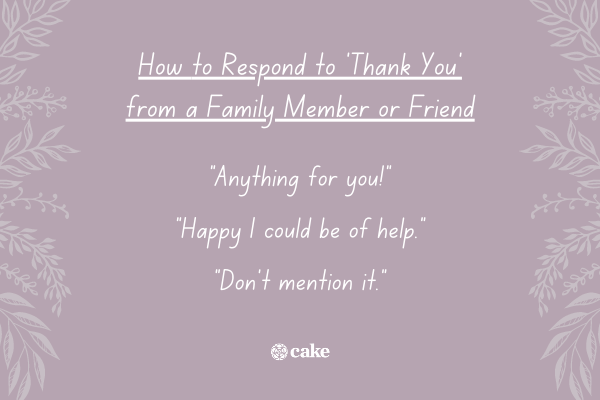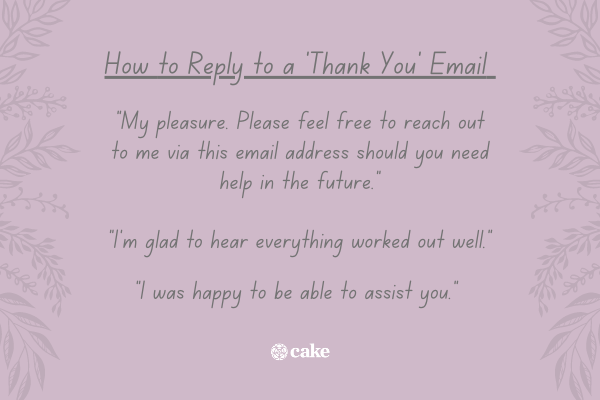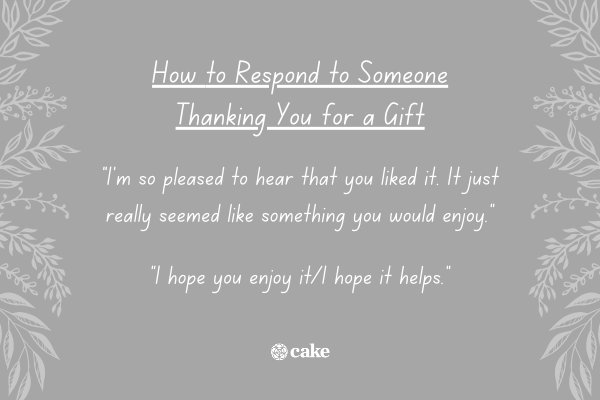If Someone Says Thank You What Should We Reply
Cake values integrity and transparency. We follow a strict editorial process to provide you with the best content possible. We also may earn commission from purchases made through affiliate links. As an Amazon Associate, we earn from qualifying purchases. Learn more in our affiliate disclosure.
In recent years, an interesting linguistic debate has begun to take place. Many young people and people in the service industry have begun saying "no problem" instead of "you're welcome." People saying this are generally trying to communicate a positive message.
Jump ahead to these sections:
- How to Respond to 'Thank You' to a Family Member or Friend
- How to Respond to 'Thank You' at Work
- How to Reply to a 'Thank You' Email
- Funny Ways to Respond to 'Thank You'
- How to Respond to Someone Thanking You for a Gift
Namely, they're trying to say that thanking them for their service isn't necessary because they're just doing their job. They also tend to feel that "no problem" is better suited for casual interactions than the more stilted response of "you're welcome." This practice has begun to spread outside of the service realm and into day-to-day life.
But saying "no problem" isn't always well-received. Some people believe that saying "no problem" implies that serving them is a problem, or at least has the potential to be. There ends up being a disconnect between the person delivering the message and the recipient. Here, we explore some other responses you can explore when someone thanks you.
Tip: It's always appreciated to send someone a nice, handwritten note. We recommend keeping a pack of blank greeting cards around for when the situation arises.
How to Respond to 'Thank You' from a Family Member or Friend

When friends and family members thank us, it's tempting to brush it off. Many of us are uncomfortable in the face of gratitude when we would have been happy to help regardless, even if our family doesn't know how to ask . But your friends and family deserve a more thoughtful response.
Here are some ways you can respond to a thank you from your loved ones.
- "Anything for you!"
- "Happy I could be of help."
- "Don't mention it."
1. "Anything for you!"
Okay, so you probably don't mean you would do literally anything for your friend or family member.
You might not help them flee from justice, for instance (although that might depend on what they did). But you would likely do anything in your power and within reason to help a loved one. These three words ably convey that sentiment.
2. "Happy I could be of help."
When our friends and family members need support, we want to be able to help them however we can.
When we can help them, it is an incredibly gratifying feeling. It's often all the reward we need. Saying that you're happy you could help sounds like "you're welcome," but it can ultimately be taken at face value.
3. "Don't mention it."
This isn't always an appropriate response. If you work in a customer-facing position, it may give off the same energy that "no problem" does. But for friends and family, this is a more than acceptable response.
If you consistently help a friend and family member out by babysitting or taking them to doctor's appointments, they'll thank you every time. Saying "don't mention it" acknowledges their thanks, while gently letting them know you're still happy to help.
How to Respond to 'Thank You' at Work
As we stated above, the "no problem" response originated largely in service-oriented positions. If you work in retail or customer service, it may be tempting to default to this response. You may even want to use it if you work in a traditional office setting. But you never know who might find "no problem" to be less-than-polite. These responses convey a similar sentiment in different words.
Here are some ways you can respond to a thank you at work:
- "I'm happy to be of service."
- "I know you would help me if I needed it. I'm glad to do the same for you."
- "It's my pleasure."
4. "I'm happy to be of service."
This is a great alternative to "no problem" for people working in the service industry. It's a more upbeat spin on the sentiment that helping someone is no problem.
That's because you're happy to be fulfilling the responsibilities of your job. You're not really changing your message, just the words you're using to convey it.
5. "I know you would help me if I needed it. I'm glad to do the same for you."
There's a saying attributed to author John Maxwell that goes, "Teamwork makes the dream work." This saying emphasizes the importance of working together in a collaborative environment.
If you have a coworker that helps your work go more smoothly, be sure to repay the favor. And when they thank you, just point out that you didn't do anything that they wouldn't do (or haven't done already).
6. "It's my pleasure."
This particular phrase works in basically every type of workplace you can imagine.
Once again, it gives a more positive spin to the message behind the phrase "no problem." It explicitly states that you're happy to help. It works for clients and co-workers alike.
How to Reply to a 'Thank You' Email

When someone writes you a thank you note , you don't generally need to reply to it. It would be silly to go get a "You're Welcome" card to stamp and send off. But emails are instantaneous. It's a lot easier to reply to a thank you email.
Here are some ways you can respond to a thank you in an email:
- "My pleasure. Please feel free to reach out to me via this email address should you need help in the future."
- "I'm glad to hear everything worked out well."
- "I was happy to be able to assist you."
7. "My pleasure. Please feel free to reach out to me via this email address should you need help in the future."
When someone thanks you out loud, your reply is usually a quick one. When you receive an email in gratitude for something, you have more time and space to choose your words carefully.
This particular response communicates that you take pleasure in helping out when you can. It also reinforces that the person you helped is welcome to approach you in the future.
8. "I'm glad to hear everything worked out well."
Sometimes when you receive a thank you email, the gratitude is part of a longer message.
Perhaps you gave someone advice on how to handle a tricky situation. They may email you to let you know how your advice panned out and thank you for the help. If this is the case, you can simply acknowledge that you're happy your advice led to a positive outcome.
9. "I was happy to be able to assist you."
This is yet another variation of "no problem". Once again, it conveys the same messaging. It just does it in a way that's a little more palatable to people who might get touchy at the implication that a problem could exist.
It's also a little more formal than "no problem," which makes it ideally suited for written correspondence.
Funny Ways to Respond to 'Thank You'
Often, it's important to stay polite when responding to someone saying thank you. But on some occasions, it's okay to keep your reply lighthearted.
Here are some ways you can respond to a thank you in a funny way:
- "Anytime! Well, as long as it's convenient for me, that is."
- "Pas de probleme/de rien."
10. "Anytime! Well, as long as it's convenient for me, that is."
This tongue-in-cheek response pokes fun at the fact that we often say things like "Anytime" or "Anything for you." However, when we say those things, there are actually some caveats we might like to employ.
11. "Pas de probleme/de rien."
If your parents or grandparents have scolded you for saying "no problem" in the past, you may want to avoid saying it around them. But it may still be your preferred way of responding when someone says thank you.
Change it up by saying "pas de probleme" (which translates to "no problem) or "de rien" (which means "it's nothing"). These sayings sound fancy because it's in French, but they still mean what you intend to communicate.
How to Respond to Someone Thanking You for a Gift

There are many ways to show gratitude for various occasions. If you give a gift to someone, they will likely immediately thank you in person.
Here are some ways you can respond to a thank you after giving a gift:
- "I'm so pleased to hear that you liked it. It just really seemed like something you would enjoy."
- "I hope you enjoy it/I hope it helps."
12. "I'm so pleased to hear that you liked it. It just really seemed like something you would enjoy."
When someone thanks you for a present, you could just say "you're welcome". But if they're really effusive with their thanks, they may want to talk more about what inspired you to select a particular present.
This sentiment provides a good segue into talking more about why you thought they'd enjoy a certain gift. It can give them a lot of insight into what you think of them and what you value about them. This can go so much deeper than the typical expression of gratitude and response.
13. "I hope you enjoy it/I hope it helps."
When we get gifts for people, it's usually because we think that gift will bring them joy or help them with something they need assistance with. This reply helps clarify the intent of your gift.
Saying 'Thank You' in a Variety of Circumstances
If you're writing a thank-you note, many websites list thank you quotes to help you get started. There aren't nearly as many resources to tell you how to respond when someone says thanks.
Hopefully, the resources found here will help you to think outside of the "no problem" box.
Sources
- "The Problem with 'No Problem'." Psow.edu , The Protocol School of Washington, 2 October 2017, www.psow.edu/blog/the-problem-with-no-problem .
If Someone Says Thank You What Should We Reply
Source: https://www.joincake.com/blog/response-to-thank-you/